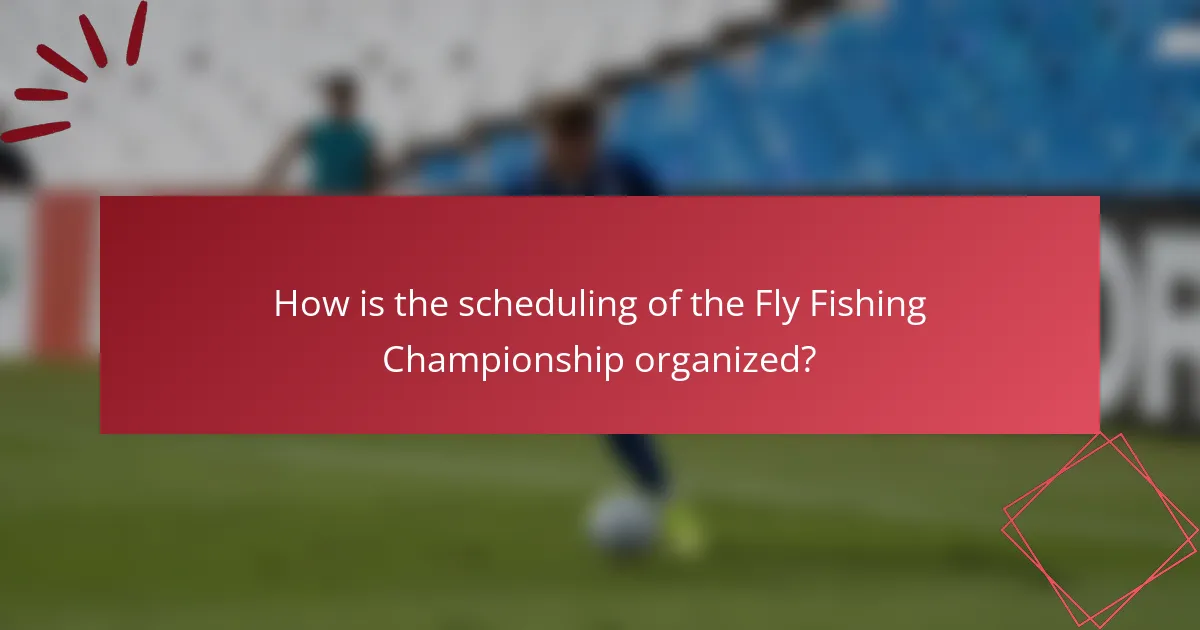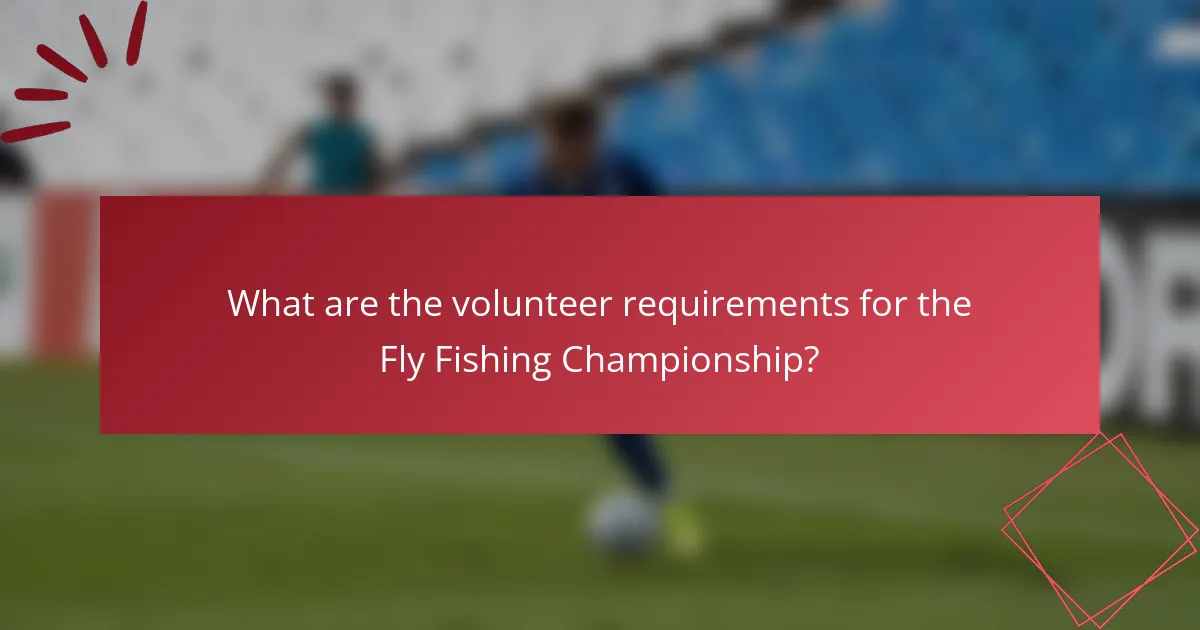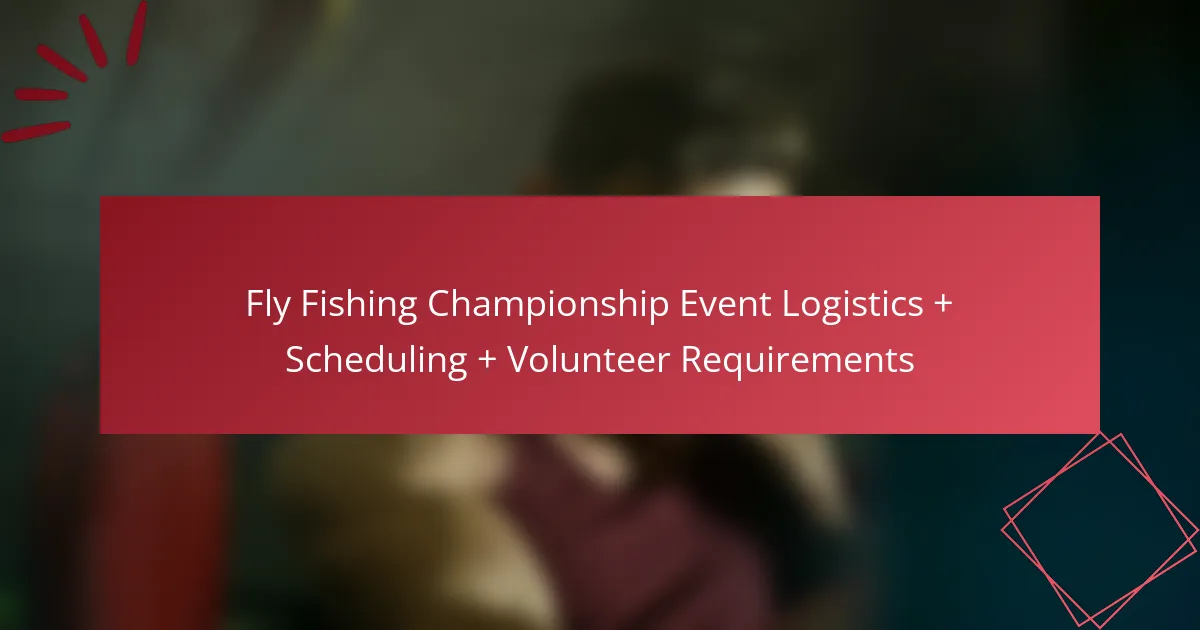The Fly Fishing Championship involves multiple logistical components essential for a successful event, including venue selection, scheduling, participant registration, equipment management, and volunteer coordination. Venue selection focuses on identifying appropriate water bodies and facilities, while scheduling establishes a structured timeline for competitions and practice sessions. Participant registration ensures compliance with competition rules, and equipment management organizes the necessary fishing gear. Volunteer coordination recruits and trains individuals to support the event, with specific requirements for age and commitment. Overall, these elements work together to ensure a seamless championship experience for participants and spectators alike.

What are the key components of Fly Fishing Championship Event Logistics?
Key components of Fly Fishing Championship event logistics include venue selection, scheduling, participant registration, equipment management, and volunteer coordination. Venue selection involves identifying suitable water bodies and facilities for the event. Scheduling encompasses setting dates, times for competitions, and practice sessions. Participant registration requires managing entries and ensuring compliance with competition rules. Equipment management involves organizing fishing gear and ensuring availability for participants. Volunteer coordination includes recruiting, training, and assigning tasks to volunteers to support the event. Each component is crucial for a successful championship event.
How does location impact the logistics of the event?
Location significantly impacts the logistics of an event by influencing accessibility, resource availability, and environmental conditions. The proximity to transportation hubs affects how easily participants and supplies can reach the venue. For instance, a location near major roads or airports facilitates smoother travel for attendees. Additionally, the local infrastructure determines the availability of necessary resources such as accommodations and catering services. Environmental factors, such as weather patterns and terrain, also play a crucial role in planning activities and ensuring safety. Events held in remote or rugged areas may require more extensive logistical support, including transportation for equipment and personnel. Historical data shows that events held in well-connected locations tend to attract higher attendance due to ease of access.
What factors should be considered when selecting a venue?
Location is a critical factor when selecting a venue for an event. Proximity to water bodies is essential for fly fishing activities. Accessibility for participants and spectators should also be considered. Parking availability is important for convenience. Venue capacity must align with expected attendance. Amenities such as restrooms and shelters enhance participant experience. Availability of permits for fishing activities is necessary. Lastly, the venue’s reputation can influence participant interest.
How does weather influence event planning?
Weather significantly influences event planning by affecting attendance, safety, and logistics. Rain, for instance, can deter participants and spectators from attending outdoor events. Extreme temperatures can create safety concerns for both attendees and staff. Weather forecasts allow planners to adjust schedules and prepare contingencies. For example, a fly fishing championship may need to reschedule or relocate if severe weather is expected. Historical data indicates that events held in pleasant weather see a 30% higher attendance rate. Additionally, weather impacts equipment and venue readiness. Planners must consider weather conditions to ensure a successful event.
What are the essential logistical requirements for hosting the event?
The essential logistical requirements for hosting the event include venue selection, equipment procurement, and participant registration. Venue selection must accommodate fishing activities and spectator access. Equipment procurement involves securing fishing gear, safety equipment, and signage. Participant registration requires a system for managing entries and fees. Additionally, scheduling must account for weather conditions and competition rules. Volunteer coordination is necessary for event management and assistance. Proper communication channels should be established for updates and emergencies. These elements are critical for a successful event execution.
What permits and regulations must be adhered to?
Fly fishing championship events must adhere to local, state, and federal regulations. Specific permits may include fishing licenses, event permits, and waterway access permits. Regulations often require adherence to conservation laws to protect fish populations and habitats. Additionally, events may need to comply with safety regulations, including crowd control and emergency response plans. Local wildlife agencies typically oversee these permits and regulations. Compliance ensures the event’s legality and promotes sustainable fishing practices.
How do transportation and accommodation arrangements affect participants?
Transportation and accommodation arrangements significantly affect participants’ overall experience and performance. Efficient transportation ensures timely arrival, reducing stress and allowing participants to focus on the event. Proper accommodation provides necessary rest and comfort, which can enhance performance levels.
When transportation is poorly managed, delays can lead to missed events or activities. Studies show that timely arrivals correlate with better performance outcomes in competitive settings. Comfortable accommodations contribute to participants’ well-being, influencing their mental and physical readiness.
Additionally, proximity of accommodations to the event venue can enhance convenience. Participants with easy access to the venue tend to report higher satisfaction levels. In summary, thoughtful arrangements in transportation and accommodation are crucial for optimizing participant experience and performance in events like the Fly Fishing Championship.

How is the scheduling of the Fly Fishing Championship organized?
The scheduling of the Fly Fishing Championship is organized through a structured timeline. This timeline includes key dates for registration, practice sessions, and competition rounds. Organizers typically set a schedule months in advance to ensure all participants are informed. Each day of the championship is planned to maximize fishing opportunities and minimize downtime. Specific time slots are allocated for different categories of participants. Weather conditions are also monitored to adjust the schedule if necessary. This organized approach helps maintain a smooth flow of the event. Coordination with local authorities ensures compliance with regulations and safety protocols.
What factors determine the schedule of the event?
The schedule of the event is determined by several key factors. These factors include venue availability, participant registration deadlines, and weather conditions. Venue availability impacts when the event can be held. Participant registration deadlines ensure that all competitors are accounted for before the event. Weather conditions influence safety and fishing conditions, which can lead to rescheduling. Additionally, the schedule may be affected by sponsorship commitments and local regulations. Each of these factors plays a crucial role in finalizing the event’s timing.
How do participant availability and local conditions influence scheduling?
Participant availability and local conditions significantly influence scheduling. Availability of participants affects the selection of dates and times for events. If key participants are unavailable, rescheduling may be necessary. Local conditions, such as weather or water levels, also impact scheduling decisions. For example, adverse weather may lead to postponements for safety reasons. Additionally, local regulations can dictate permissible fishing times. These factors must be considered to ensure participant safety and event success.
What is the importance of timing for different competition rounds?
Timing is crucial for different competition rounds in fly fishing championships. It ensures that each round is conducted efficiently and fairly. Proper timing allows for equal opportunities among competitors. Scheduled breaks are necessary for participants to rest and regroup. Timing also affects the overall flow of the event. For example, delays can lead to frustration among competitors and spectators. Accurate timing helps in maintaining the integrity of the competition. Adhering to a set schedule allows for better resource management, including volunteer assignments and equipment readiness. Ultimately, effective timing enhances the competitive experience for all involved.
What tools can be used to effectively manage event scheduling?
Event scheduling can be effectively managed using various tools. Popular options include Google Calendar, Microsoft Outlook, and Eventbrite. Google Calendar allows users to create events, set reminders, and share schedules with others. Microsoft Outlook integrates email and calendar functions for streamlined communication. Eventbrite specializes in event planning and ticketing, making it ideal for larger gatherings. Other tools like Trello and Asana can help manage tasks related to scheduling. These tools improve organization and coordination among team members. Their widespread use in event management confirms their effectiveness.
How can technology streamline the scheduling process?
Technology can streamline the scheduling process by automating appointment bookings and reminders. Scheduling software allows users to set available times and manage multiple appointments efficiently. This reduces the likelihood of double bookings and scheduling conflicts. Real-time updates can be sent to all participants, ensuring everyone is informed of changes. Additionally, integration with calendars synchronizes schedules across devices. Data analytics can optimize time allocation based on past events. Overall, technology enhances communication and organization in the scheduling process.
What are best practices for communicating the schedule to participants?
Clearly communicate the schedule to participants through multiple channels. Use email, social media, and event websites for dissemination. Ensure the schedule is concise and easy to read. Provide updates as changes occur to keep everyone informed. Utilize visual aids like infographics for better understanding. Schedule reminders closer to the event date to reinforce timing. Encourage participants to ask questions for clarification. Collect feedback on the communication process to improve future events.

What are the volunteer requirements for the Fly Fishing Championship?
Volunteers for the Fly Fishing Championship must be at least 18 years old. They should have a passion for fishing or outdoor activities. Volunteers need to commit to specific shifts during the event. Training sessions are required prior to the championship. Volunteers are expected to assist with various tasks, including registration and event setup. A background check may be required for some positions. Experience in customer service is beneficial but not mandatory. These requirements ensure a smooth and enjoyable event for participants and spectators.
What roles do volunteers play during the event?
Volunteers play essential roles during the event. They assist with registration and check-in processes. Volunteers help guide participants to their designated areas. They provide information about the event schedule and activities. Volunteers also support safety measures by monitoring the fishing areas. They help set up and dismantle event equipment. Additionally, volunteers may assist in distributing materials and refreshments. Their contributions enhance the overall experience for both participants and spectators.
How can volunteers assist in logistical operations?
Volunteers can assist in logistical operations by providing support in various areas. They can help with event setup and breakdown, ensuring that all materials are in place. Volunteers can manage registration desks, facilitating a smooth check-in process for participants. They can also assist with crowd control, guiding attendees to designated areas. Additionally, volunteers may help with transportation logistics, moving equipment and supplies as needed. Their involvement can improve communication among teams, ensuring everyone is informed and coordinated. Studies show that effective volunteer engagement enhances event efficiency and participant satisfaction.
What responsibilities do volunteers have on event day?
Volunteers have several responsibilities on event day. They assist with setup and breakdown of the event area. This includes arranging tables, chairs, and signage. Volunteers also help with registration and check-in processes for participants. They provide information and directions to attendees. Volunteers may assist in managing the schedule of activities. They ensure that events run smoothly and on time. Additionally, they may help with food and beverage distribution. Volunteers play a crucial role in maintaining a positive atmosphere throughout the event.
How can volunteers be recruited and trained effectively?
Volunteers can be recruited and trained effectively through targeted outreach and structured training programs. Effective recruitment involves identifying the specific skills needed for the event. Utilizing social media platforms and local community organizations can broaden the reach. Engaging potential volunteers with clear messaging about the event’s mission increases interest. Training should include orientation sessions that cover roles and responsibilities. Providing hands-on training opportunities enhances volunteer preparedness. Follow-up support and feedback during the event ensure volunteers feel valued. Research shows that volunteer retention increases with proper training and recognition, leading to a more successful event.
What strategies can be used for volunteer outreach?
Effective strategies for volunteer outreach include targeted recruitment, community engagement, and leveraging social media. Targeted recruitment focuses on identifying specific groups that align with the event’s mission. For example, local fishing clubs or environmental organizations can be approached for volunteers. Community engagement involves hosting informational sessions to educate potential volunteers about the event. This can increase interest and participation. Leveraging social media platforms allows for wider outreach. Posting engaging content can attract a diverse audience. Additionally, creating partnerships with local businesses can enhance visibility and support. These strategies have been proven effective in similar events, increasing volunteer participation significantly.
How should training sessions be structured for volunteers?
Training sessions for volunteers should be structured in a clear and organized manner. Each session should begin with an overview of the event’s goals and objectives. This establishes a context for the volunteers. Next, specific roles and responsibilities should be outlined. Volunteers need to understand their tasks and how they contribute to the event’s success.
Interactive components should be included, such as hands-on activities or role-playing scenarios. This engages volunteers and reinforces learning. Time for questions and feedback should be integrated into each session. This ensures that volunteers feel supported and informed.
Finally, a summary of key points should conclude the training. This reinforces the information shared and ensures retention. Evidence from successful volunteer programs shows that structured training enhances volunteer confidence and effectiveness.
What are some best practices for ensuring a successful Fly Fishing Championship?
Establish clear rules and guidelines for the Fly Fishing Championship. This ensures all participants understand the competition structure. Organize a detailed schedule that includes registration, competition times, and award ceremonies. This helps keep the event on track and participants informed. Secure knowledgeable judges to assess the competition fairly. Their expertise adds credibility to the event. Provide adequate resources, such as fishing gear and safety equipment, for participants. This ensures safety and enhances the experience. Communicate effectively with volunteers about their roles and responsibilities. Well-informed volunteers contribute to smooth event operations. Lastly, promote the championship through various channels to attract participants and spectators. Increased visibility can lead to greater success and community engagement.
How can effective communication enhance event logistics?
Effective communication enhances event logistics by ensuring all stakeholders are informed and coordinated. Clear communication reduces misunderstandings among organizers, volunteers, and participants. It facilitates timely updates on schedules and changes, which is crucial for smooth operations. For instance, a study by the Project Management Institute found that effective communication can improve project success rates by 20%. Additionally, regular briefings keep everyone aligned on their roles and responsibilities. This alignment minimizes delays and boosts efficiency during the event. Overall, effective communication is vital for seamless logistics management in events like the Fly Fishing Championship.
What contingency plans should be in place for unexpected challenges?
Contingency plans for unexpected challenges in a fly fishing championship event should include a detailed risk assessment. This assessment identifies potential challenges such as weather disruptions, equipment failures, or participant emergencies. A communication plan must be established to inform all stakeholders promptly. This includes volunteers, participants, and sponsors. Backup resources should be arranged, such as alternative venues or additional equipment suppliers. Training sessions for volunteers should cover emergency protocols and first aid. Regular updates and rehearsals can ensure readiness for unforeseen situations. Documenting all plans and procedures is essential for clarity and quick reference during the event.
The main entity of the article is the Fly Fishing Championship, focusing on its event logistics, scheduling, and volunteer requirements. Key components of event logistics include venue selection, scheduling, participant registration, equipment management, and volunteer coordination, each critical for successful execution. The article also examines how location and weather influence logistics, essential logistical requirements, necessary permits and regulations, and the impact of transportation and accommodation on participant experience. Additionally, it outlines the roles and responsibilities of volunteers, effective recruitment and training strategies, and best practices for ensuring a successful championship event.
